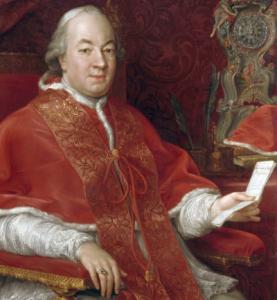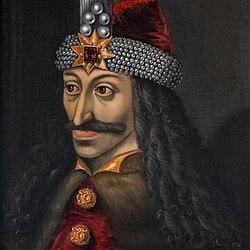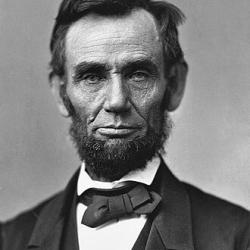Last Time on HORATS
And NOW
1775 by whatever quirk of history or cosmology,
was one heck of a ride around the sun.
Many facts are taken virbadium with some variations from Wikipedia.
The 17th century was a time in which
- Michelangelo’s Sistine Chapel and statue of David exist.
- Leonardo’s Mona Lisa and The Last Supper exist.
- William Shakespeare’s plays exist
- The music of Johann Sebastian Bach exists.
- The novel Don Quixote, Pilgrim’s Progress and Paradise Lost exists.
- America had a revolution that started a country.
- 70 years before the Revolution: July 20, 1705 – The planet Mercury transits Jupiter, as seen by astronomers from Earth. The event happens again on October 4, 1708, but will not be seen again from Earth until October 27, 2088
- 60 years before the Revolution: May 3, 1715 – A total solar eclipse is seen across southern England, Sweden and Finland (the last total eclipse visible in London for almost 900 years). English astronomer Edmond Halley (who is using the old style Julian calendar date of April 22) records the first observation noted of the phenomenon of “Baily’s beads“, in which higher elevations on the moon can be observed obscuring portions of the light moments before and after totality.
- 56 years before the Revolution:April 25 1719: Robinson Crusoe by Daniel Defoe is first published.
- 49 years before the Revolution:1726- Gulliver’s Travels, by Jonathan Swift is first published.
- 30 years before the Revolution: 1735 Giovanni Battista Piazzetta paints The Assumption of Mary. (The Louvre)
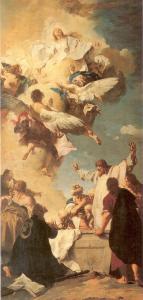
- 26 years before the Revolution: 1749-The Mass in B minor is an extended setting of the Mass ordinary by Johann Sebastian Bach. The composition was completed the year before the composer’s death, and was to a large extent based on earlier work, such as a Sanctus Bach had composed in 1724.
- 20 years before the Revolution: March 12 ,1755– A steam engine is used in the American colonies for the first time as New Jersey copper mine owner Arent Schuyler installs a Newcomen atmospheric engine to pump water out of a mineshaft.
- years before the Revolution:March 12 ,1755
- 10 years before the Revolution: 1765- John Hannon (or alternatively spelled “Hannan” in some sources) and the American physician Dr. James Baker started importing beans and producing chocolate in the Lower Mills section of Dorchester, Massachusetts.
- 6 years before the Revolution: 1769-St. Junipero Serra founds his first mission in San Diego,California.
1775
The Year of the Revolution
This was a year in which
Marie-Suzanne Giroust – Self-portrait with an image of Maurice Quentin de La Tour (approximate date)
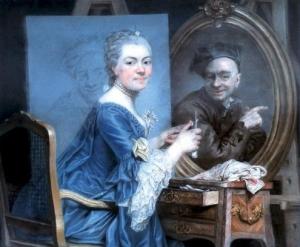
Arrivals
Charles Lamb (February 10, 1775 – December 27, 1834) author of Tales from Shakespeare (1807) along with his sister Mary Anne Lamb (December 3,1764 – May 20, 1847)
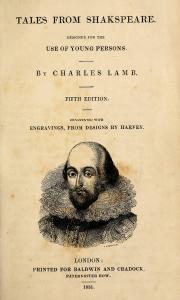
Departures
Paul of the Cross (January 3, 1694 – October 18, 1775) was an Italian Roman Catholic mystic, and founder of the Passionists.
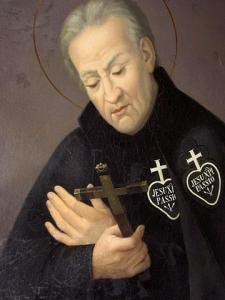
Publications Hot of the Press
- Samuel Johnson A Journey to the Western Islands of Scotland
- Pierre Beaumarchais – The Barber of Seville
- Geoffrey Chaucer – The Canterbury Tales of Chaucer (Thomas Tyrwhitt, editor). Originally published in between 1387 and 1400.
Sanctifying Time
February 15 – Pope Pius VI succeeds Pope Clement XIV as the 250th pope. Pius VI saw the development of the Catholic Church in the United States of America. He released the American clergy from the jurisdiction of the Vicar Apostolic in England and erected the first American episcopal see, the Diocese of Baltimore in November 1789.
For the same reason you should undoubtedly always give special attention to the beauty of the house of God and the splendor and dignity of objects dedicated to the divine service. Such beauty and splendor often greatly inspire the faithful, and draw them to the veneration of sacred realities. It would be very improper for the bishop’s house to be cleaner and furnished more tastefully than the abode of holiness, the palace of the living God. It would make no sense to see holy vestments, adornments for the altar and all the furniture in the church worn out with age and torn or dirty, while the bishop’s table is well laden, the priest’s clothing very clean and finely coordinated.5.
Pope Pius VI – Inscrutabile – On the Problems of the Pontificate, December 25, 1775
Revolutionary War
“Keep in mind that when we were founded by those Americans of the eighteenth century, none had had any prior experience in revolutions or nation making. They were, as we would say, winging it. They were idealistic and they were young. We see their faces in the old paintings done later in their lives or looking at us from the paper money in our wallets, and we see the awkward teeth and the powdered hair, and we think of them as elder statesmen.
But George Washington, when he took command of the Continental Army at Cambridge in 1775, was forty-three, and he was the oldest of them. Jefferson was thirty-three when he wrote the Declaration of Independence. John Adams was forty. Benjamin Rush – one of the most interesting of them all – was thirty when he signed the Declaration. They were young people, feeling their way, improvising, trying to do what would work. They had no money, no navy, no real army. There wasn’t a bank in the entire country.
It was a country of just 2,500,000 people, 500,000 of whom were held in slavery. And think of this: Few nations in the world know when they were born. We know exactly when we began and why we began and who did it.”
— David McCullough (The American Spirit: Who We Are and What We Stand For)
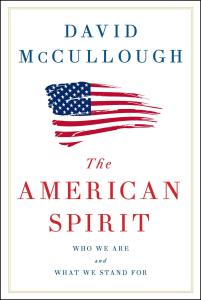
- February 9 – The Great and Powerful Parliament of Great Britain declares the Province of Massachusetts Bay (my birth state) to be in rascally radical rebellion.
- March 23 – Patrick Henry, a delegate to the Second Virginia Convention after the Virginia House of Burgesses was disbanded by the Royal Governor, delivers his not yet famous historical “Give me Liberty, or give me Death!” epic speech at St. John’s Church in Richmond, Virginia.
If we were base enough to desire it, it is now too late to retire from the contest. There is no retreat but in submission and slavery! Our chains are forged! Their clanking may be heard on the plains of Boston! The war is inevitable and let it come! I repeat it, sir, let it come. It is in vain, sir, to extenuate the matter. Gentlemen may cry, Peace, Peace but there is no peace. The war is actually begun! The next gale that sweeps from the north will bring to our ears the clash of resounding arms! Our brethren are already in the field! Why stand we here idle? What is it that gentlemen wish? What would they have? Is life so dear, or peace so sweet, as to be purchased at the price of chains and slavery? Forbid it, Almighty God! I know not what course others may take; but as for me, give me liberty or give me death!
- April 18 – Paul Revere and William Dawes, instructed by Dr. Joseph Warren, ride from Boston to Lexington to warn John Hancock and Sam Adams that British forces are coming to take them prisoner and to seize colonial weapons and ammunition in Concord.
“LISTEN, my children, and you shall hear
Of the midnight ride of Paul Revere,
On the eighteenth of April, in Seventy-five;
Hardly a man is now alive
Who remembers that famous day and year.
He said to his friend, “If the British march
By land or sea from the town to-night,
Hang a lantern aloft in the belfry arch
Of the North Church tower as a signal light, —
One, if by land, and two, if by sea;
And I on the opposite shore will be,
Ready to ride and spread the alarm
Through every Middlesex village and farm,
For the country folk to be up and to arm.”
― Paul Revere’s Ride
- April 19 – Battles of Lexington and Concord:Hostility between Britain and its American colonies explodes into bloodshed, igniting the American Revolutionary War which officially ends on February 3, 1783 when Great Britain acknowledges the independence of the United States of America. At this time, the Spanish government does not grant diplomatic recognition. The battle is an important key date in American Catholic History
Another problem was that the guns they used in those days, called muskets, took forever to load. First you had to put your powder in, then you had to put in a little piece of flint, then you had to ram some wadding down there, then you had to put in about a quarter teaspoon of paprika, and finally you had to put in your musket ball, which usually popped right back out again because there was hardly any room.
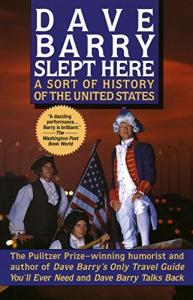
It took so long to complete the Battle of Lexington that the two sides were nearly four hours late to the next scheduled event, the Battle of Concord. This was where the Americans invented the innovative guerrilla tactic of rushing up to the British, who were still dithering around with their formation (‘‘Dammit, Nigel! You’re supposed to be part of the ‘O’!’’), and bonking them manually over the heads with their unloaded muskets.
Dave Barry Slept Here: A Sort of History of the United States by Dave Barry | Goodreads
- June 17 – Two months into the colonial siege of Boston, British open fire on Breed’s Hill on Charles Town Peninsula. After 3 charges, the British take the hill in the misnamed Battle of Bunker Hill.
- July 3 – George Washington takes command of the 17,000-man Continental Army at Cambridge. He wouldn’t become our first president until 14 years later in 1789 and it would last till 1797.
- July 4- One Year away from The United States Declaration of Independence being adopted by the Second Continental Congress in 1776.
- July 6 – American Revolution: The Continental Congress issues Declaration of the Causes and Necessity of Taking Up Arms, which contains the words: “Our cause is just. Our union is perfect… being with one mind resolved to die freemen rather than to live slaves…”.
- July 26 – The Second Continental Congress appoints Benjamin Franklin to be the first Postmaster General of what later becomes the United States Post Office Department.
- August 23 – American Revolution: Refusing to even look at the Olive Branch Petition, King George issues a Proclamation of Rebellion against the American colonies.
- October 13 – American Revolution: The Continental Congress orders the establishment of the Continental Navy (later the United States Navy).
- October 26 – American Revolution: George III announces to Parliament that the American colonies are in an uprising and must be dealt with accordingly.
- November 5 – George Washington issues an order forbidding any troops under his command from participating in Pope Night. Pope Night was an anti-Catholic holiday celebrated annually. It evolved from the British Guy Fawkes Night, which commemorates the failure of the Gunpowder Plot of 1605.
- December 31 – American Revolution: Battle of Quebec – British forces repulse an attack by Continental Army generals Richard Montgomery and Benedict Arnold at Quebec; Montgomery is killed.
While The Colonists Were Rebelling Against Mother England,
This Also Happened
- January 17 – Second voyage of James Cook: Captain James Cook takes possession of South Georgia for the Kingdom of Great Britain.
- March 17 – Catherine the Great of Russia issues a manifesto prohibiting freed serfs from being returned to serfdom.
- July 30 – Second voyage of James Cook: HMS Resolution (1771) anchors off the south coast of England, Captain Cook having completed the first eastbound global circumnavigation.
- St. Elizabeth Ann Seton SC turns 1 year old. (August 28, 1774 – January 4, 1821)
- August 29 – September 12 – The Independence Hurricane from South Carolina to Nova Scotia kills 4,170, mostly fishermen and sailors.
The Sound of Music and Other Cultural Milestones
James Watt‘s 1769 steam engine patent is extended to June 1800 by Act of Parliament and the first engines are built under it.
- Wolfgang Amadeus Mozart was composing music.
- Carl Philipp Emanuel Bach the fifth child and second surviving son of Johann Sebastian Bach and Maria Barbara Bach was composing music.
- Symphony in D major, H.663
- Symphony in F major, H.665
- Johann Christian Bach the eighteenth child of Johann Sebastian Bach, and the youngest of his eleven sons was composing music.
– Sinfonia concertante, W.C 34
What a year.
BUT on July 4, 1776
The Continental Congress ratifies the declaration by the United States of its independence from the Kingdom of Great Britain. with United States Declaration of Independence: One of the signers of the DOI was Charles Carroll. He was the only Catholic signatory of the Declaration and the longest surviving, dying 56 years after its signing. His cousin John Carroll served as the first bishop of the Diocese of Baltimore, the first diocese in the new United States. He later became the first archbishop of Baltimore. Until 1808, Carroll administered the entire American Catholic Church.
Also earlier that year on March 14, 1776,Captain John Barry received his first captain’s commission in the Continental Navy on signed by John Hancock, president of the Second Continental Congress. Barry was a religious man and began each day at sea with a reading from the Bible. He had great regard for his crew and their well-being and always made sure they were properly provisioned while at sea.
During his naval career Barry commanded the U.S. warships Delaware, Lexington, Raleigh, Alliance and United States.
Also these American Classic books were published…
Thomas Paine’ s Common Sense
Adam Smith‘s An Inquiry into the Nature and Causes of the Wealth of Nations
Also in this year.
1776 –Will-o’-the-wisp is an atmospheric ghost light seen by travellers at night, especially over bogs, swamps or marshes. The phenomenon is known in much of European folklore by a variety of names, including jack-o’-lantern, friar’s lantern, and hinkypunk, and is said to mislead travellers by resembling a flickering lamp or lantern. Alessandro Volta (February 18, 1745 – March 5, 1827) first proposed that natural electrical phenomena (like lightning) interacting with methane marsh gas may be the cause of ignis fatuus.
My Brother Sam Is Dead (1974) by James Lincoln Collier and Christopher Collier. The book takes place in Redding, Connecticut during the American Revolution, and is told from the perspective of a young boy, Tim Meeker. The novel details Tim’s brother, Samuel, and his desire to fight for the Patriots, despite his father’s opposition to the war. Ultimately, Tim is forced to decide between siding with his brother and joining the colonies’ war efforts, or abiding by his father’s anti-war wishes.
The novel received various book awards and nominations from the National Book Foundation and American Library Association, but was later ranked in ALA’s “Most Frequently Challenged Books” and “Banned/Challenged Books” from 1990 to 2000 and 2000 to 2009. During this time period, the novel was subject to much controversy surrounding its use in elementary school classrooms, given several counts of violence and profanity throughout the book.- Wikipedia
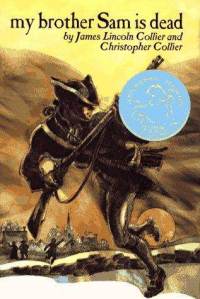
George Washington’s Socks (1991) by Elvira Woodruff.
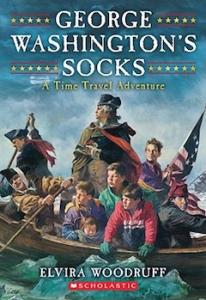
Followed by George Washington’s Spy: A Time-travel Adventure (2010)
Ater this…
- June 14, 1777 – The Stars and Stripes is adopted by the Continental Congress as the flag of the United States.
- June 21, 1777– Encyclopædia Britannica Second Edition begins publication in Edinburgh.
- January 18, 1778 – Third voyage of James Cook: Captain James Cook, with ships HMS Resolution and HMS Discovery, first views Oahu then Kauai in the Hawaiian Islands of the Pacific Ocean, which he names the Sandwich Islands.
- July 4, 1778– American Revolutionary War: George Rogers Clark takes Kaskaskia with the help of Father Pierre Gibault, the village priest.
1778 – Flying Snakes! Carl Linnaeus (May, 23 1707 – January 10, 1778) dies. Draco is a genus of agamid lizards that are also known as flying lizards. Carl Linnaeus described the genus in 1758, with the type species being Draco volans. The name of the genus is from the Latin term for mythological dragons.
- 1779 – Olney Hymns in 1779. This work had a great influence on English hymnology. The volume included Newton’s well-known hymns: “Glorious Things of Thee Are Spoken,” “How Sweet the Name of Jesus Sounds!, and “Faith’s Review and Expectation,” which has come to be known by its opening phrase, “Amazing Grace“.
1/2 a decade later
The War is still going on.
And so is this…
1780
- May 19 – New England’s Dark Day: An unaccountable darkness spreads over New England, regarded by some observers as a fulfillment of Bible prophecy.
- July 17 – The first bank created in the United States, the Bank of Pennsylvania, is chartered.
- September 21 – Benedict Arnold gives detailed plans of West Point to Major John André. Three days later, André is captured, with papers revealing that Arnold was planning to surrender West Point to the British.
- 1780 – Josephinism is a name given collectively to the domestic policies of Joseph II, Holy Roman Emperor (1765–1790). During the ten years in which Joseph was the sole ruler of the Habsburg monarchy (1780–1790), he attempted to legislate a series of drastic reforms to remodel Austria in the form of what liberals saw as an ideal Enlightened state. This provoked severe resistance from powerful forces within and outside his empire, but ensured that he would be remembered as an “enlightened ruler” by historians from then to the present day.
- Johann Sebastian Bach’s children and Mozart are still making music.
- John Wesley Publishes Reflections on the Rise and Progress of the American Rebellion
- Arthur Young Publishes A Tour in Ireland
TO judge of Ireland by the conversation one sometimes hears in England, it would be supposed that one half it was covered with bogs and the other with mountains filled with Irish ready to fly at the sight of a civilized being.
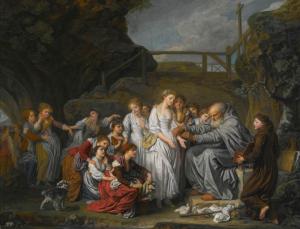
Jean-Baptiste Greuze – August 21, 1725 – 4 March 4, 1805)
The hermit or The distributor of rosaries, 1780
- January 5, 1781 – American Revolutionary War: Richmond, Virginia is burned by British naval forces, led by Benedict Arnold.
- March 13, 1781 – Sir William Herschel first observes Uranus on this date, from the garden of his house at 19 New King Street in Bath, Somerset, England (now the Herschel Museum of Astronomy) leading to its discovery as the seventh planet from the Sun thus expanding the known boundaries of the Solar System for the first time in history and making Uranus the first planet classified as such with the aid of a telescope. The discovery of Uranus also effectively doubled the size of the known Solar System because Uranus is around twice the distance from the Sun as the planet Saturn.
- April 10, 1781 – Future U.S. President Andrew Jackson, age 14, is slashed by a British officer’s sword at his home near Waxhaw, North Carolina, after refusing to clean the officer’s boots, an event that leaves physical and psychological scars.
- June 20, 1782– The bald eagle is chosen as the emblem of the United States of America. On the same day, the Confederation Congress adopts the design for the Great Seal of the United States.
- August 7, 1782 – George Washington orders the creation of the Badge of Military Merit (or the Order of the Purple Heart) to honor soldiers’ merit in battle (reinstated later by Franklin D. Roosevelt, and renamed to the more poetic “Purple Heart“, to honor soldiers wounded in action)
Finally in
1783
The War Ends
- February 3, 1783 – American Revolutionary War: Great Britain acknowledges the independence of the United States of America. At this time, the Spanish government does not grant diplomatic recognition.
- February 4, 1783 – American Revolutionary War: Great Britain formally declares that it will cease hostilities with the United States.
- February 28, 1784 – John Wesley ordains ministers for the Methodist Church in the United States.
- July 1st 1784 —The Pope’s Nuncio called, and acquainted me that the Pope had, on my recommendation, appointed Mr. John Carroll superior of the Catholic clergy in America, with many of the powers of a bishop; and that probably he would be made a bishop in partibus before the end of the year. Gloria Romanorum: Ben Franklin Nominates a Bishop ~ Catholicism and the Early American Republic
- August 28, 1784 – St. Junípero Serra, Spanish Franciscan missionary dies. (b. 1713)
- November 27, 1784 – The phenomenon of black holes is first posited in a paper by John Michell, in the Philosophical Transactions of the Royal Society of London.
The Cabin Faced West (1958) Jean Fritz.

Next Time on
HOARATS
To Understand
What I love and How I Write About History
Hit the Link Above.
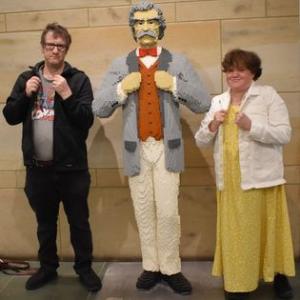
To understand about this particular series I’m writing about, please read
The Catholic Bard’s Guide To History Introduction
And to view a historical article click on


